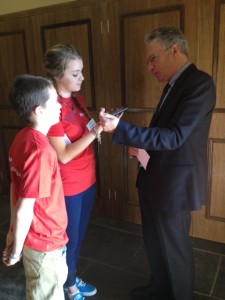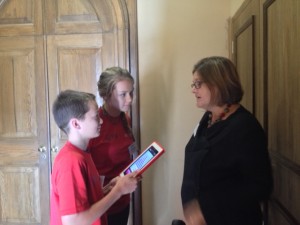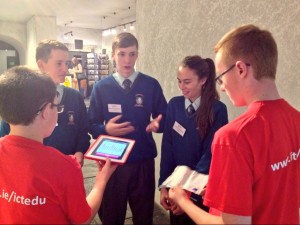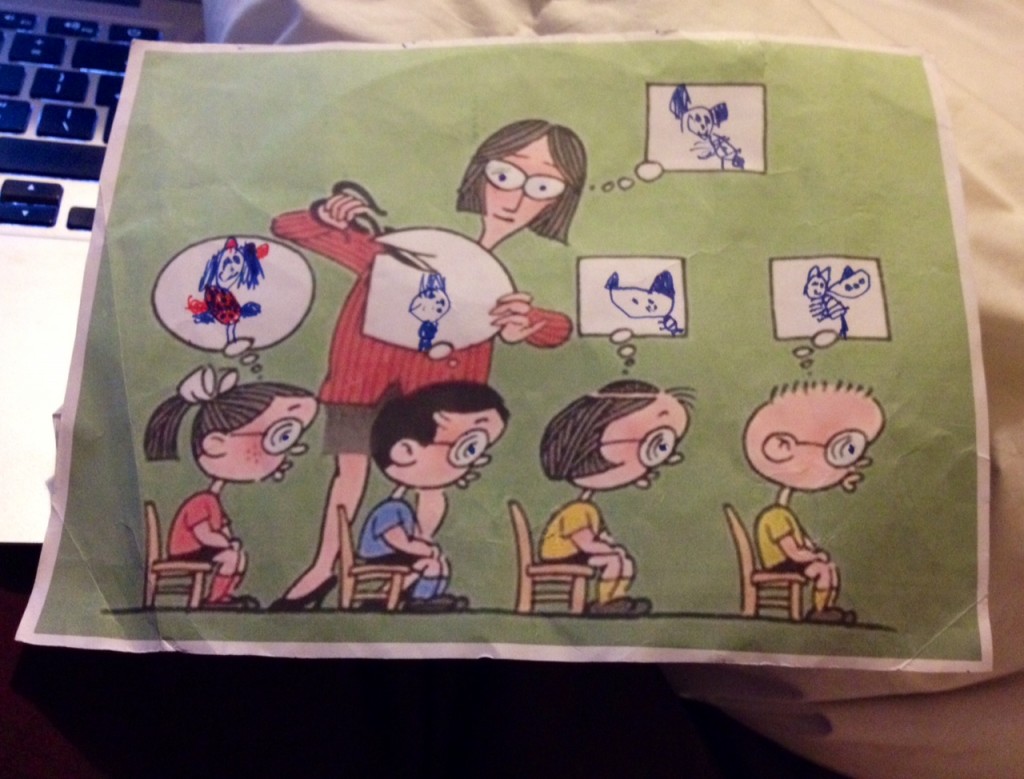Get a cup of coffee.
This is even longer than the last post on the new Junior Cycle English specification!!!
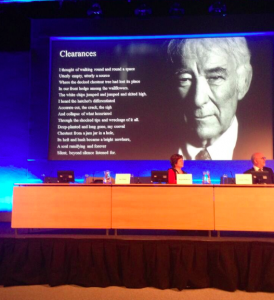
We began with Seamus. What better way to begin, with a room full of English teachers. Roy Foster (who did a beautiful job of remembering Seamus Heaney in the Guardian) inspired a recitation of “Clearances” by Declan O’Neill and for a moment we were all united by our love of language, of beauty, of genius.
Finian O’Shea, the keynote speaker, was wonderfully engaging, even when the questions he posed were challenging and sometimes downright scary. What do we do in an era when reading is in decline yet the literacy demands we face daily are ever on the increase? My mind immediately jumped to this article my husband John showed me recently (albeit UK based) stating that only 13% of parents read bedtime stories to their children every night. Only today our first year students completed a survey on their reading habits (we’re gathering baseline data for our Literacy and Numeracy Strategy) and a whooping 53% of them “rarely or never” read outside of school work. It’s enough to make a grown woman cry, particularly if that grown woman is an English teacher. However, it pays to remember that despite being beaten over the head repeatedly with Ireland’s poor showing in the most recent PISA rankings (as though we the English teachers were personally responsible for the ever diminishing prevalence of reading as a leisure activity in our society), not everyone agrees that PISA offers us anything useful at all, except a stick to beat teachers with.
Anyway, back to the conference. Finian offered the following list as the things we need to be thinking about as English teachers:
1. Literacy skills – explicitly teaching vocab. Understanding not just spellings. Checking for comprehension.
2. Texts – examine the meaning of the word ‘text’. Lots of information comes at us these days in a non-text based format. We NEED to engage with the digital space, to expose them and us to multimodal texts. To interrogate them.
3. Reading and writing skills – we’ve been fighting this battle for a long time fellow English teachers. Now is not the time to give up. Just gotta keep on keeping on.
4. Discussion and presentation skills – hence the new focus on oral skills in the specification for Junior Cycle.
5. Listening and viewing skills – this links in to the idea that “texts” now refers to more than just the printed word!
6. Critical thinking skills – it always comes back to learning to think and learning to learn.
He also spoke about the HOW of making this happen – the student as an active agent, learning as a developmental process, the importance of drawing on prior knowledge and experience, environmental based and local learning opportunities, guided activity, discovery and practice, gradually removing reliance upon the teacher, collaboration and cross-curricular links. This is a journey I’m on at the moment, day by day trying to be less the sage on the stage and more guide on the side for my pupils. I can tell you from experience, it’s a bloody steep learning curve, a kind of two steps forward, one step back marathon rather than an overnight transformation, but one which is bearing fruit, for the most part.
For further reading Finian suggested “I read it but I don’t get it” by Chris Towani and “Babies Need Books” by Dorothy Butler (out of print). Given the stats above about how few parents read to their children every night, I think it might be the parents not the English teachers who need to read this latter gem!!!
The workshops part of the day included:
- Planning for First Year English
- Responding to poetry in the First Year Classroom
- School Based Assessment and Moderation
- Oral Language in the Classroom
- Junior Cycle English in the Digital Age
Each of us signed up for two workshops and attended one before lunch and one after lunch. I enjoyed the “Oral Language in the Classroom” session but to be honest it felt more like in-service than consultation. Yes, we could all see the value of using multimodal texts in our classrooms, and the example of the “RTE Doc on One” series was welcomed by everyone in the room as a good starting point when seeking out texts.
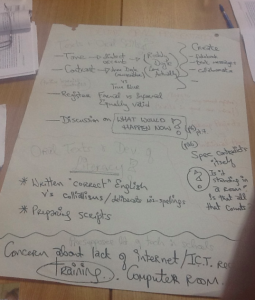
But we didn’t really get clarity around what the “oral presentation” might look like, nor did we get answers to what we felt were quite pressing questions:
- can shy or weak students record their presentation or does it have to be delivered ‘live’ in front of peers?
- can presentations be digital?
- are group projects acceptable?
- can oral interviews be used for assessment purposes?
For example, if students wanted to make their own collaborative radio documentary, could this be used for assessment purposes, even though each student must be assessed individually? The specification seems to contradict itself in that there is a focus on collaboration within the JC framework yet for assessment purposes each individual seems to have to offer work for assessment in a stand alone capacity.
Due to the phrasing of the specification, there is a danger that teachers will narrowly interpret the oral language presentation as only valuing students’ ability to stand in a room and speak. We wanted an answer to the question “is that all that counts?”. We wanted to know if pre-recorded (or re-recorded until they got it right) digital segments (podcasts and films and videos and poetry readings) would be acceptable but we got no definitive answers.
A kind interpretation says that’s because the consultation process was still open. A kind interpretation says they don’t want to be too prescriptive because that goes against the very spirit of the new Junior Cycle.
A more cynical view is that we got no answers because they simply don’t know – or worse still, they’ll leave it up to individual schools to decide for themselves! Then watch as schools end up competing with each other! Not good. Yet I want to have the freedom to make decisions locally based on what’s happening in my school and in my locality. I guess I can’t have it both ways!
So my final thoughts on the oral dimension of the new Junior Cycle spec are as follows: if I can do it my way, this part of the new spec really excites me but if the spec is left as it’s written, I have visions of classes up and down the country sitting listening to presentations for weeks on end as each one is delivered in real time to a restless, bored audience by disgruntled surly teens. God spare us this hell I say!
Lunch was a delightful encounter with familiar faces from INOTE – Fiona Kirwan and Mary Farrell and Roisin Moran and a lively chat with a few teachers and Junior Cycle Support Service peeps I hadn’t met before. As usual I talked way too much and I’m sure at least a few of them left the table thinking ‘thank God I don’t work with her, she never shuts up!’ but I’ve long since made peace with my verbal diarrhoea so what harm!
Also, if my comment about familiar faces above seems really cliquish, let me assure you I didn’t even join INOTE until 2011, it’s just once you chat to a fellow English teacher at a few events, most of the time it very rapidly feels like you’ve known them your entire life. We’re cut out of the same cloth us lot! To join the conversation (it’s not a clique, seriously. I’d never have gotten in if it was!) just sign up here: http://www.inote.ie/?page_id=371 and you’re in. The conference is coming up on the 19th October and as far as I know there are still a couple of places still available (schedule of events and bookings are available here: http://www.eckilkenny.ie/inote/). Better still, join the closed facebook group for brilliant exchanges of ideas and resources. It’s got 226 members and is growing all the time!
After that I met up with some of my twitterati buddies @fboss and @levdavidovic and poor Fintan couldn’t get rid of me for the rest of the day!
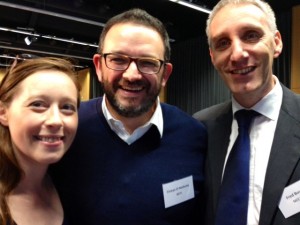
We headed off to the workshop on Junior Cycle English in the Digital Age and I was delighted to meet more of my virtual twitter friends Kevin Cahill (who was giving the workshop) and Eoghan Evesson. Kevin gave an engaging, passionate and robust overview of where we’re at with tech and asked us to consider this in groups and suggest where we might go next. He’s a great public speaker, a fired-up educator and if I was back in school, I’d want to be in his class.
Again, if this sounds like a cult, I apologise, but twitter has offered me accessible and invaluable CPD from the comfort of my own couch for the past two years and I would truly be lost without it. If you want to lurk but not contribute, just go to www.twitter.com/search and type in #edchatie (it stands for ‘education chat in Ireland’) to see why I’m raving about it so much. I also got to sit with Patricia Maguire, who I’ve never met before, but she’s active on the INOTE facebook page and blew us all away last year when she described a project her students did to recreate Romeo & Juliet in real time on facebook. I was impressed with her virtual self already, and her real self is even more impressive, in a very modest, self-effacing way. She seems to do amazing things with tech in her classroom. To be honest, I just really wanted more time with these people to see what they’re doing in their classrooms and how they’re doing it. Teachers teaching teachers offers amazing scope for professional development and the teachers I met were the best part of my day.
Nonetheless, there are still massive problems to be overcome with integrating digital skills and using digital media in our classrooms. Our schools are under resourced when it comes to tech so parents are being asked to step into the breach, again; our teachers are crying out for more training; our equipment is in many cases falling apart and, almost comically in this day and age, we do not have IT technicians in our schools. We have a secretary and a caretaker but we do not have an IT technician in every secondary school in the country. Think about this for a second. What other organisation with in excess of 400 individuals in situ – in some cases 600, 800, 1000, 1,200 – is expected to just muddle through when the tech breaks down. It’s not comical, it’s tragic and insulting to our profession. Only the day after the conference my projector threw a wobbly and suddenly I was facing the prospect of teaching without my extra limb for who knows how long before the damn thing would be fixed again. We have a guy who comes in once a week. Praise be to Jesus he was in today and managed to fix it but if he had needed parts I’d have been at least another week teaching back in the stone age. I know this sounds like whinging; that’s because it is whinging. But it is legitimate whinging! Don’t ask me to integrate tech in my classroom and yet leave me wallowing in conditions that militate against my every effort. I need more devices, I need wifi in my classroom… I could go on but I won’t. Because I know what you’ll say – there is no money. Sigh!
One really positive aspect of the afternoon session (and there were loads – this was my favourite part of the day!) was that Kevin was able to give us more clarity around the oral presentation aspect of the new JC spec – basically, he asked if digital formats would be accepted and the answer, my friends, is YES!!!! Whoop, whoop! I almost hollered with relief at this news!!! Assessments can be digital – well hallelujah and amen to that 😉
The plenary session provided an overview of the consultation process thus far. I was going to offer a link so you could read the short and succinct interim report, but it’s disappeared off the juniorcycle.ie website, so, oh well! Never mind!
Basically Hal O’Neill said the draft specification wanted to assist teachers in making decisions about students’ progress which is why they had included annotated examples in the draft specification. I personally find the annotated examples a bit irritating and patronising. English teachers don’t have a major issue distinguishing between grades when assessing students work. We do it all the time. We know what an A looks like, and a B, and a C and a D. Our issue is not professional incompetence. Our issue is with extremely large class sizes and lack of time to offer the kind of individualised and focused feedback that everyone who knows anything about learning knows makes all the difference.
If you’ll humour me for a moment let me quote from my original response to the draft specification:
“to give each pupil I teach 10 minutes individualised feedback a week:
200 x 10 = 2000 mins or 33hrs 20 mins
Experienced teachers know that you can’t really offer this during class time – once the roll is done and an activity started (and this is assuming you don’t do any whole class teaching) you’d get around to 3 pupils maximum. That means neglecting 90% of the class while giving your attention to 10%. To assess and offer feedback on one piece of work would then take up ten class periods but to cover the curriculum you’d need to have long moved on from whatever that exercise was before ten classes had passed.
So my job starts to look like this:
22 hrs class teaching,
33 hrs corrections (but in reality, senior cycle essays take about 25mins to correct not 10 mins)
12 hrs class preparation (many weeks this is a vast underestimation)
5 hrs subject department/croke park/school self evaluation/literacy and numeracy/ICT
3 hrs extra-curricular
= 75 hour working week
= hospitalisation.
Anyone who knows anything about me at all knows that I am a complete workaholic, but even I know this isn’t healthy”.
I get really fed up when people suggest, either directly or indirectly, that it’s some kind of laziness on my part when I raise this issue or that my reluctance to assess my own pupils is somehow evidence that I’m not really ‘professional’ at what I do. That my concerns about paperwork are unfounded; that my anxiety over assessing neighbours kids and colleagues kids and maybe even some day my own kid is evidence that I’m some kind of luddite.
They do this in other countries you know, I keep being told.
I’m sure they do.
But this isn’t other countries.
This is Ireland.
We are very insular and very local and have a long history of bribery and corruption and brown envelopes and a pushy middle class who don’t care what they have to do to get ahead…
I’m not unprofessional.
I’ll tell you what I am.
I’m scared.
I’m scared my job will start to look like this: http://theuphillstruggle.wordpress.com/2013/04/21/an-open-letter-to-michael-gove/
I’m scared I’ll get so fed up I’ll want to leave teaching, the only thing I’ve ever really wanted to do. And I know change is hard and I know change is inevitable and some of the change I really really see the value of and I want to be at the centre of making the learning experience better for my students. But I wish we had more teachers, smaller classes, more resources, more training, more time. That’s not the fault of the NCCA. I like a lot of their vision for the future and I really like the trouble they’ve taken to offer real and meaningful consultation. Just this evening I was online for the webinar they organised to – yet again – hear the thoughts of English teachers on what we like and what we want clarified and what our concerns are.
It’s fair to say at this point if you’re an English teacher and you haven’t had any input into the draft specification for English, it’s your own bloody fault because you’ve had more than enough opportunities over the last few months. Maybe not in person – I know lots and lots of teachers who were irate not to get a place at the conference – but certainly online.
Speaking of which, when I arrived at the conference I had a few minutes of thinking I’d have to turn on my tail and leave, as I was a last minute addition to the list of attendees. They had no record of me at the desk and I had to pull out my email and prove that I wasn’t just a total chancer looking for a day off work. Instead of a printed name tag I had this little number but I was just grateful they let me in:
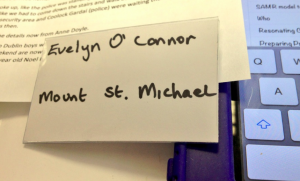
As I was taking my leave of Fred and Fintan, I got to speak briefly to Anne Looney. She’d read my feedback (I felt reassured that they’re listening!) and I joked about sneaking in, with my fake looking badge on show for all the world to see. Anyway, she didn’t kick me out or anything, she said she’d reserved a few places all along for teachers who had offered particularly detailed feedback on the draft specification. I guess mine was just so late arriving I only got in by the skin of my teeth.
By hook or by crook, I was glad I got to go even though it meant an insane week: Croke Park hours Monday evening; work then Dublin Weds/Thurs; work and funeral in Ennis Friday; and back to the big smoke on Saturday for TEDxDublin. No wonder it’s taken me this long to process the day…
POSTSCRIPT:
I’m putting this here because the comments section won’t allow me to embed photos:
To clarify: I taught for eight years without using any edtech. I like to think I did a pretty decent job. I would never in a million years judge another teacher’s methods, nor consider them a luddite or a dinosaur for not using tech.
However, if I’ve moved on and now prefer a blended approach, the system should keep up with me, not hold me back. If other teachers want to learn more, the system should support that, not hold them back.
Also, before some bizarre misconception around my relationship with books somehow becomes fact, I worked in The Best Bookshop in Ireland whilst in university and learned as much if not more about books in the shop as I did in college:
http://www.irishtimes.com/life-and-style/best-shop-2013/best-bookshop-charlie-byrne-s-1.1518556
This is my study:

And yesterday these arrived for our book club:

Love of tech and love of books compliment each other beautifully. They are not mutually exclusive.




